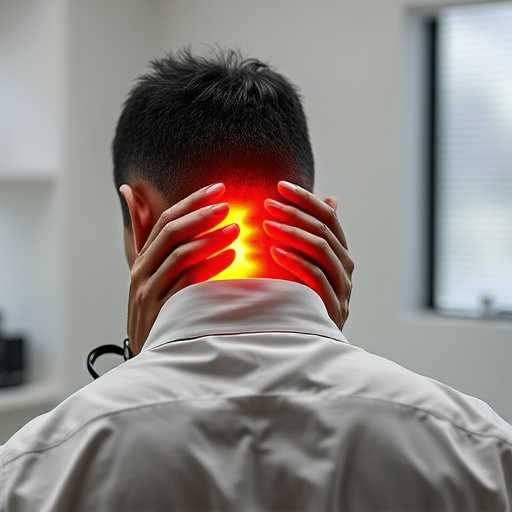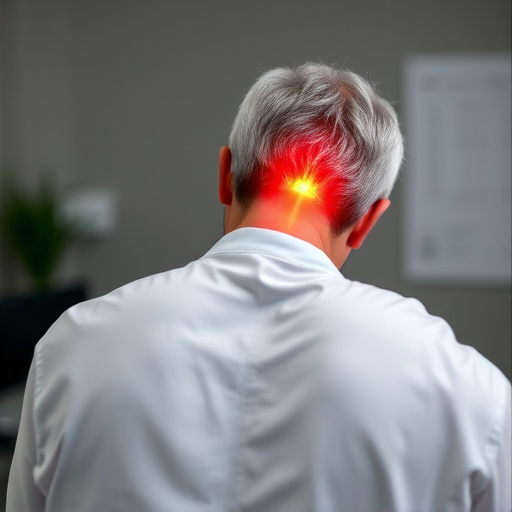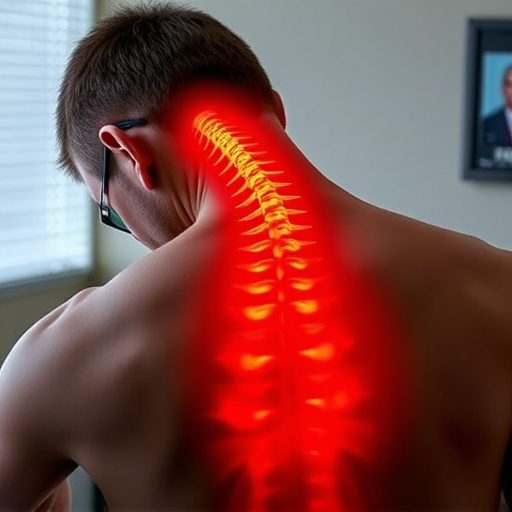Recurring headaches, from tension-type to debilitating migraines, are multifaceted. Whiplash treatment specialists play a pivotal role in addressing severe cases linked to neck injuries or underlying conditions. They employ advanced diagnostic tools like MRI and CT scans, along with manual therapy techniques to relieve musculoskeletal tension. Personalized treatment plans may include medication, physical therapy, biofeedback, and behavioral therapies, targeting specific headache types for long-term relief. Non-pharmacological approaches such as yoga and massage complement these efforts. Adopting holistic strategies focusing on postural management, physical therapy, and specialist interventions can significantly reduce headache frequency and intensity over time.
“Experience a constant battle with severe recurring headaches? You’re not alone. This comprehensive guide delves into the intricate world of managing these debilitating conditions. We explore various causes, from common to complex, including the role of whiplash treatment specialists in offering targeted relief. Discover advanced diagnosis techniques and personalized treatment plans that go beyond medication. Learn about non-pharmacological pain management and long-term prevention strategies for a life free from headache dominance.”
- Understanding Severe Recurring Headaches: Causes and Types
- The Role of a Whiplash Treatment Specialist in Headache Management
- Advanced Techniques for Diagnosing Recurrent Headaches
- Personalized Treatment Plans for Effective Relief
- Non-Pharmacological Approaches to Manage Chronic Pain
- Long-Term Care and Prevention Strategies for Severe Headaches
Understanding Severe Recurring Headaches: Causes and Types

Severe recurring headaches can significantly impact an individual’s quality of life, and understanding their causes is crucial for effective management. These headaches often fall into several categories, with tension-type headaches being the most common, characterized by mild to moderate pain and a feeling of pressure around the head.
Another notable type is the migraine, which can be debilitating and often includes additional symptoms like nausea, sensitivity to light and sound, and visual disturbances. Whiplash treatment specialists highlight that recurring headaches may also arise from various underlying conditions, such as cervical spine issues, sinus problems, or even stress and anxiety. Identifying the specific type of headache and its triggers is essential for tailoring a suitable treatment plan, which might include medication, lifestyle adjustments, or specialized therapies like physical therapy or counseling.
The Role of a Whiplash Treatment Specialist in Headache Management

Whiplash treatment specialists play a crucial role in managing severe recurring headaches, especially those linked to neck injuries or underlying whiplash conditions. These experts are trained to diagnose and treat musculoskeletal disorders, including the complex interactions between the spine, nerves, and muscles that can contribute to chronic headache pain. Using advanced techniques like manual therapy, chiropractic adjustments, and specialized exercises, a whiplash treatment specialist can help alleviate tension in the neck and upper back regions, reducing the frequency and intensity of headaches.
In addition to hands-on treatments, these specialists often incorporate patient education and lifestyle modifications into their care plans. By teaching individuals about posture, ergonomics, and stress management strategies, they empower patients to take a more proactive role in headache prevention and self-care. This holistic approach not only addresses the physical aspects of headaches but also considers the psychological and emotional factors that can exacerbate pain, offering a more comprehensive and effective solution for managing severe recurring headaches.
Advanced Techniques for Diagnosing Recurrent Headaches

Advanced diagnostic techniques play a pivotal role in understanding and treating severe recurring headaches. Beyond standard medical history and physical examinations, specialized clinics often employ cutting-edge imaging technologies like MRI and CT scans to reveal structural abnormalities or inflammation. Additionally, electrodiagnostic tests such as EEG (Electroencephalography) can help diagnose conditions like migraines or cluster headaches by measuring brain activity.
Whiplash treatment specialists also contribute significantly to accurate diagnosis. They assess neck mobility and pain patterns, recognizing how whiplash injuries from accidents or sports can trigger chronic head pain. These experts use specialized tools and manual therapy techniques to identify specific trigger points, offering a more nuanced approach to treating recurring headaches rooted in musculoskeletal issues.
Personalized Treatment Plans for Effective Relief

For many individuals suffering from severe recurring headaches, a personalized treatment plan is key to achieving lasting relief. Unlike one-size-fits-all approaches, specialized care considers unique factors like medical history, lifestyle, and specific headache types. A whiplash treatment specialist, for instance, can offer targeted interventions for tension headaches often associated with neck strain or injury.
These tailored plans may include a combination of techniques such as medication management, physical therapy, biofeedback, and behavioral therapies. By addressing the root causes and employing advanced treatments, specialists aim to provide effective, long-term solutions. This individualized approach ensures that patients receive the most appropriate care for their specific needs, ultimately enhancing quality of life and reducing headache frequency and intensity.
Non-Pharmacological Approaches to Manage Chronic Pain

Chronic pain from severe recurring headaches can be challenging to manage, but non-pharmacological approaches offer effective alternatives for those seeking relief. Techniques such as physical therapy and massage can significantly reduce tension and stress in the neck and head regions, which are often culprits in debilitating headache cycles. Whiplash treatment specialists play a crucial role here, using specialized techniques to correct muscle imbalances and alleviate pain associated with whiplash injuries—a common trigger for chronic headaches.
In addition to hands-on therapies, mindfulness practices like meditation and yoga have proven beneficial. These activities help individuals develop coping mechanisms by promoting relaxation and improving their connection with bodily sensations, allowing them to better manage the frequency and intensity of recurring headaches.
Long-Term Care and Prevention Strategies for Severe Headaches

For individuals suffering from severe recurring headaches, implementing long-term care strategies is essential for effective management and prevention. Beyond acute treatments, patients should consider a holistic approach to mitigate headache frequency and intensity. One key aspect is postural management, which includes maintaining proper ergonomics at work and home to reduce strain on the neck and upper back, common triggers for headaches. Regular physical therapy sessions can help strengthen muscles, improve flexibility, and address any underlying posture issues that may contribute to chronic pain.
Additionally, a whiplash treatment specialist can play a crucial role in managing headaches related to neck injuries or whiplash incidents. These specialists offer tailored interventions, such as specialized massage techniques, manual therapy, and exercise programs, to alleviate muscle tension and reduce nerve irritability. Preventative measures like stress management techniques, regular sleep patterns, and dietary adjustments also fall under the specialist’s guidance, promoting overall well-being and reducing headache triggers.














